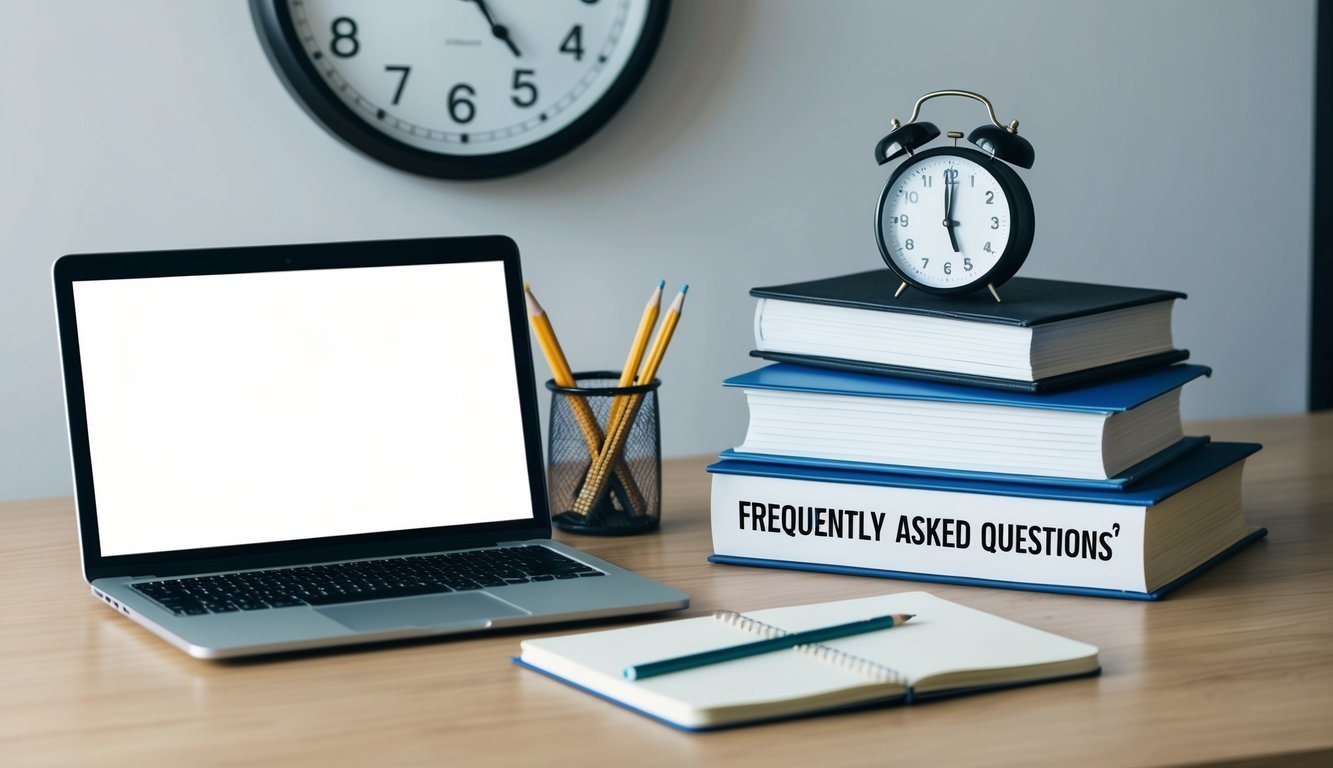PsychNewsDaily Publishers
100 Summit Drive
Burlington, MA, 01803
Telephone: (320) 349-2484
PsychNewsDaily Publishers
100 Summit Drive
Burlington, MA, 01803
Telephone: (320) 349-2484
Students can enhance their test-taking abilities by employing strategies such as early studying, creating organized study spaces, practicing with past papers, and managing test anxiety effectively.

Many students face challenges when it comes to taking tests, which can impact their performance. Learning effective test-taking strategies can help improve confidence and results on exam day. With the right tips and techniques, anyone can enhance their skills and manage test anxiety.

This article will explore seven practical tips that can assist students in becoming better test takers. From developing strong study habits to mastering relaxation techniques, these strategies will empower students to tackle their exams with ease and focus.
Starting to study early can really help reduce stress. It gives students time to learn and understand the material without rushing.
Planning to begin studying at least a week or more before the test is ideal. This way, students have time to review what they learned and can ask questions if they need help.
Creating a study schedule is a good idea. It allows students to break down the material into smaller, more manageable parts. This makes studying feel less overwhelming and more organized.
When students space out their studying, they are more likely to remember what they’ve learned. Using methods like flashcards or practice tests can make studying more effective.
In short, starting early and staying organized can lead to better test performance and less anxiety before the exam. This approach helps build confidence and prepares students for success.
Creating a good study space can make a big difference in how well someone learns. It’s important to find a quiet spot in the home. This helps reduce distractions.
Good lighting is another key factor. Natural light is best, but a bright lamp can help too. The right lighting makes reading and writing easier.
Comfort is essential. A cozy chair and a clean desk can make studying more enjoyable. It’s also important to keep everything organized. Having all materials like books and notes in one place saves time.
Managing noise is crucial. Using noise-canceling headphones or playing soft music can help keep focus. They can also try using scents like peppermint to help stay alert.
Finally, personalizing the study area can boost motivation. Adding some favorite items or colors might inspire creativity. A well-organized study space sets the stage for success.
Using past exam papers is a smart way to prepare for a test. They show what types of questions are usually asked. This helps in knowing what to expect on the actual test day.
It can be helpful to set a timer while practicing. This teaches time management skills, so they can get used to answering under pressure.
He or she can also review the answers after completing the practice tests. This review helps to identify areas that need improvement.
Working through these papers can make students feel more comfortable and confident. It gives them a sense of familiarity with the test layout and question styles.
Grabbing a few past papers from several years can provide a diverse range of questions. This builds a solid understanding of the subject matter.
By regularly practicing with these papers, students can improve their test-taking skills over time.
Reading all the instructions is very important when taking a test. It helps avoid mistakes that can cost points. Many students skip this step and miss key details.
Before starting, they should take a moment to go over the instructions. This can include how many questions there are, time limits, and special rules. Knowing these details can make the test easier to manage.
While taking the test, they should continue to refer back to the instructions. If something is unclear, it’s okay to ask the teacher or proctor for help.
Being careful with instructions can save time and make the test less stressful. Following directions means they can focus on answering questions correctly. Each point matters, so paying attention is key for success.
Managing time well during tests can make a big difference. He or she should start by looking over the entire test. This helps them see what questions will take longer and which ones are quicker to answer.
It is important to budget time for each section. They can divide the total time by the number of questions. This gives a good idea of how long to spend on each question.
If they hit a tough question, it’s smart to move on and return later. Spending too much time on one question can make it hard to finish the test.
Writing key formulas or concepts on the test paper can save time. This lets them refer back without digging through notes.
Practicing under timed conditions can help. This builds comfort with the pace needed for the actual test. Being well-prepared means less stress and better time management when it counts.
Feeling nervous before a test is common. Using relaxation techniques can help reduce that stress. Simple methods can be very effective.
Deep breathing is one easy technique. Inhale slowly through the nose, hold for a few seconds, and then exhale through the mouth. This helps slow the heart rate and calm the mind.
Progressive muscle relaxation is another great method. She can tense and then relax different muscle groups, starting from the toes and moving up to the head. This helps release built-up tension.
Visualization can also be helpful. He can picture himself in a calm place or imagine doing well on the test. This positive imagery can boost confidence before the exam.
Mindfulness exercises, like focusing on the present moment, can lower anxiety. Taking a few minutes to sit quietly and focus on breathing can improve concentration.
Combining these techniques before and during a test can be very beneficial. They help create a sense of calm and focus needed for success.
Regular review and self-testing can greatly enhance test-taking skills. This helps information stick in the mind better.
Setting aside time each week to go over notes and key concepts makes a big difference. Students can use flashcards or quiz apps to test their knowledge.
Self-testing not only checks what one remembers but also highlights areas that may need more focus. It can ease the stress of exams by making test material feel familiar.
Group study sessions can be helpful, too. Talking through concepts with peers reinforces understanding and provides support.
Incorporating these habits makes studying feel more manageable and boosts confidence on test days. Keeping a routine ensures consistent review, leading to better performance.
Test anxiety is a common issue that can affect many students. It arises from various causes and can significantly impact test performance. Knowing the causes and effects can help individuals manage their anxiety better.
Several factors can lead to test anxiety. Fear of failure is one of the main causes; students worry about not meeting their expectations or disappointing others.
Lack of preparation also plays a major role. When students do not study enough or feel unprepared, stress levels can rise.
High-stakes situations often increase anxiety. Tests that determine grades, advancement, or scholarships can add extra pressure.
Other factors include perfectionism, where students set unrealistically high standards for themselves, and previous negative experiences with tests, which can create a cycle of anxiety.
Awareness of these factors is the first step toward coping with test anxiety effectively.
Test anxiety can lead to various negative effects during exams. One common outcome is difficulty concentrating. When a student feels anxious, their mind may race, making it hard to focus on the test questions.
Another effect is increased physical symptoms. These can include sweating, rapid heartbeat, or stomach aches. Such physical responses can further distract the student from their test.
Anxiety can also result in poor time management. Students may spend too long on difficult questions, leaving less time for others.
Finally, anxiety can lead to diminished confidence, affecting performance on tests. Students may second-guess their answers due to nerves, which can lower their scores. Recognizing these effects helps students take steps to manage their anxiety.
Developing strong study habits is essential for success in test-taking. With the right approach, students can manage their time better and retain information more effectively.
A study plan helps students organize their time and set clear goals. To start, they can choose a specific day and time each week to dedicate to studying. This structure creates a routine that makes studying feel manageable.
Students should outline what subjects they need to study and break down the material into smaller topics. For example, they could use a simple table to track their progress:
| Subject | Topic | Status |
|---|---|---|
| Math | Algebra | Not Started |
| Science | Biology | In Progress |
| History | WWII | Completed |
Regular study sessions should last about 30–60 minutes with short breaks in between. This helps keep focus sharp and reduces burnout.
Active learning involves engaging with the material in meaningful ways. It’s more effective than just passively reading or listening.
Students can try different techniques like summarizing information in their own words or teaching it to someone else. This approach helps deepen understanding.
Using flashcards is another great method for active recall. Creating questions on one side and answers on the other allows for quick self-testing. Group study sessions can also be beneficial as they provide different perspectives and insights.
Incorporating practice tests gives students a feel for the actual exam. This not only builds confidence but also highlights areas that need more focus. Encouraging a mix of these methods can lead to more effective study sessions.
Preparing for an exam involves more than just studying. Effective strategies on the exam day can make a big difference. Managing time well and staying calm are essential skills to help perform at one’s best.
Time management is key during an exam. It helps ensure that all questions are answered without rushing.
Using a watch or knowing the room clock can also help keep track of time.
Staying calm is crucial for doing well on a test. Stress can affect performance, so here are some tips:
Taking breaks, even if brief, can provide a chance to regroup. Staying calm allows focus on the questions ahead.

Many students seek ways to improve their test-taking abilities. The following questions address specific strategies, techniques, and resources that can help enhance performance across different age groups.
Starting to study early is key. Students should set a schedule that allows for regular review of material.
Creating a dedicated study space can also help minimize distractions.
For multiple choice exams, reading all the options before answering is crucial. Students should also eliminate clearly wrong answers to improve their chances.
It’s wise to revisit tougher questions later.
Adults can benefit from practice tests that reflect the actual exam format. They should also focus on managing their time well during the test.
Developing a routine can help reduce anxiety and improve focus.
High school students can practice with past exam papers to familiarize themselves with the format. Creating flashcards for key topics is also helpful.
Regularly teaching study material to peers can reinforce knowledge.
Middle school students should read all instructions carefully before starting.
It’s helpful for them to break the test into manageable sections for better time management.
They can also practice relaxation techniques to stay calm.
Online educational sites often offer these materials. Libraries may also have resources related to test-taking strategies. Websites dedicated to academic success can provide helpful tips and practice tests.